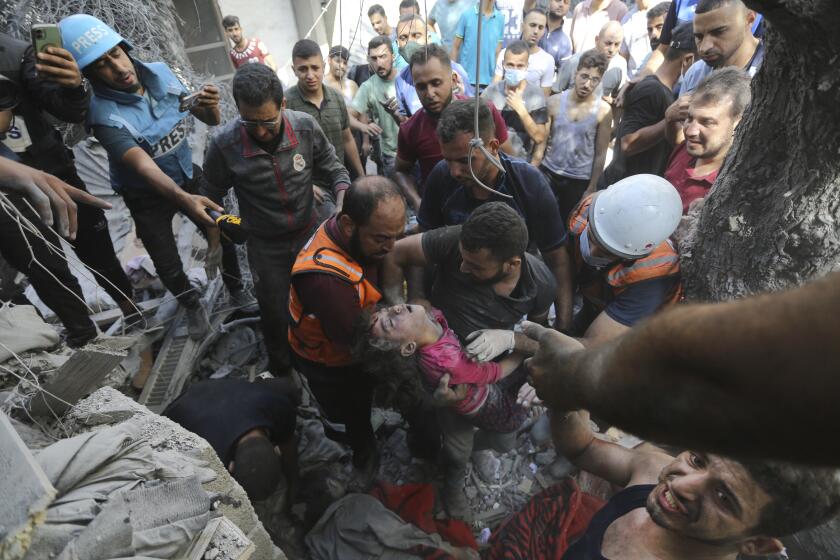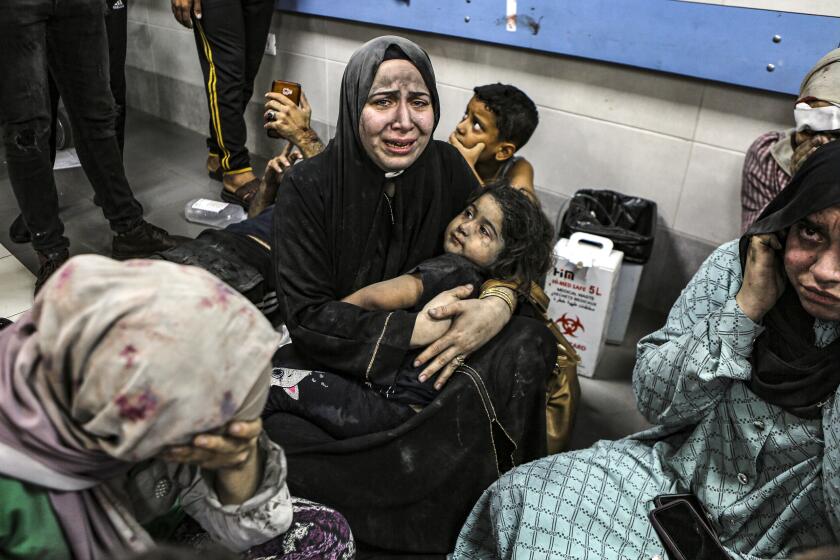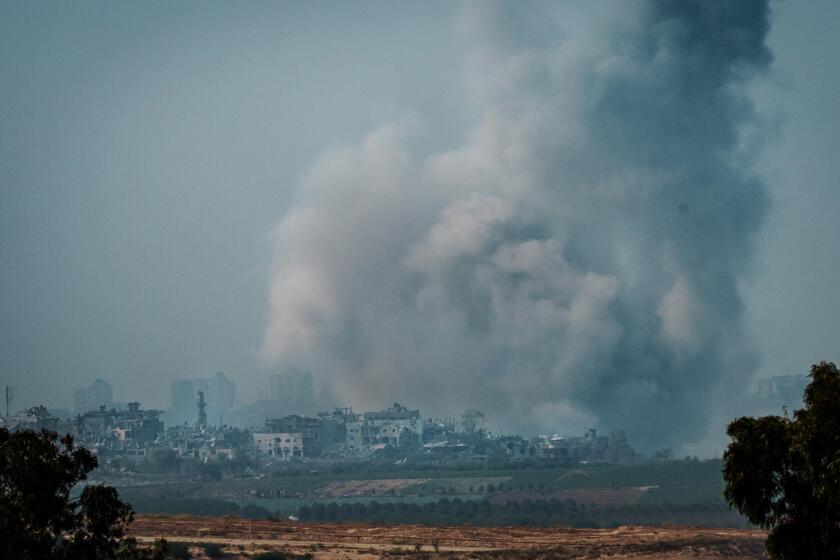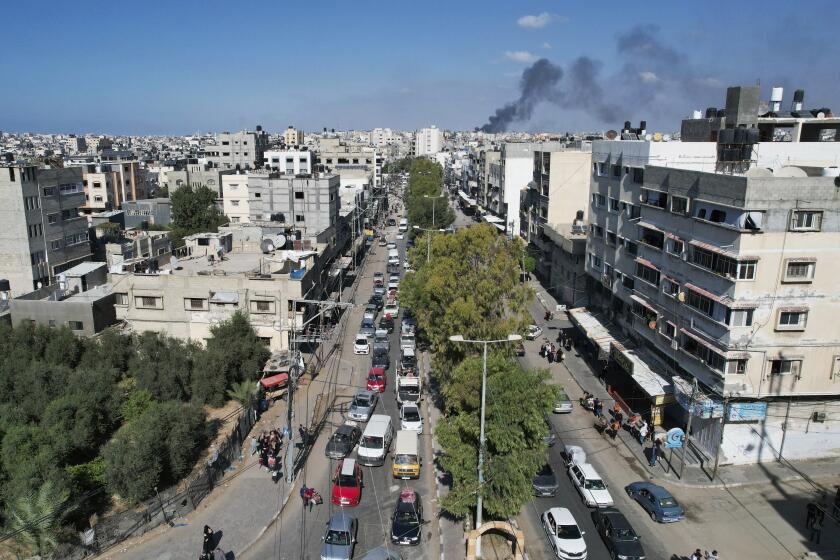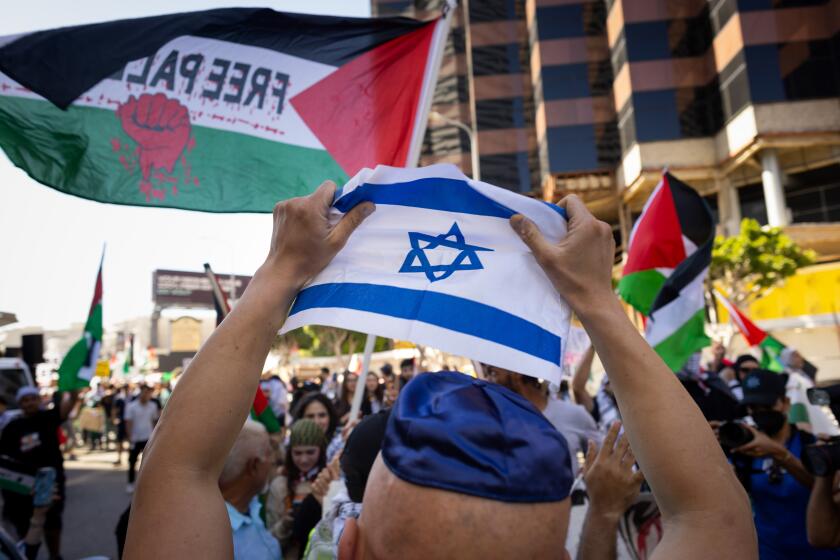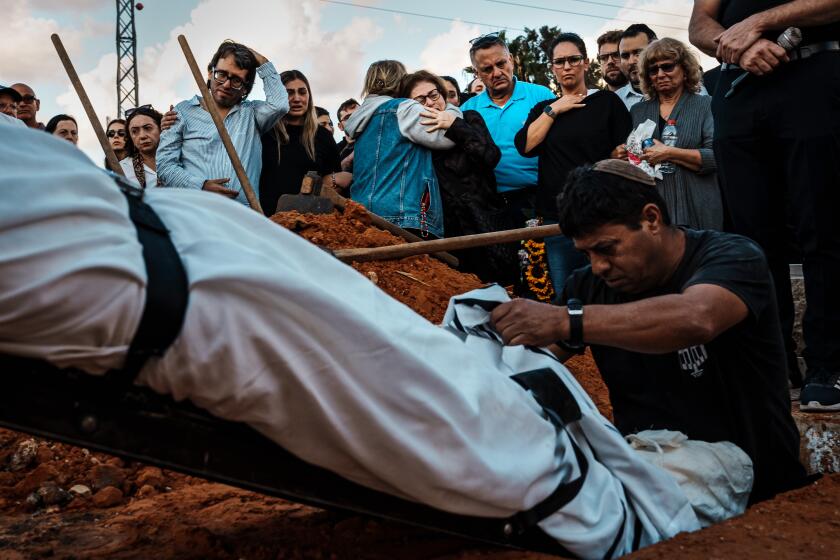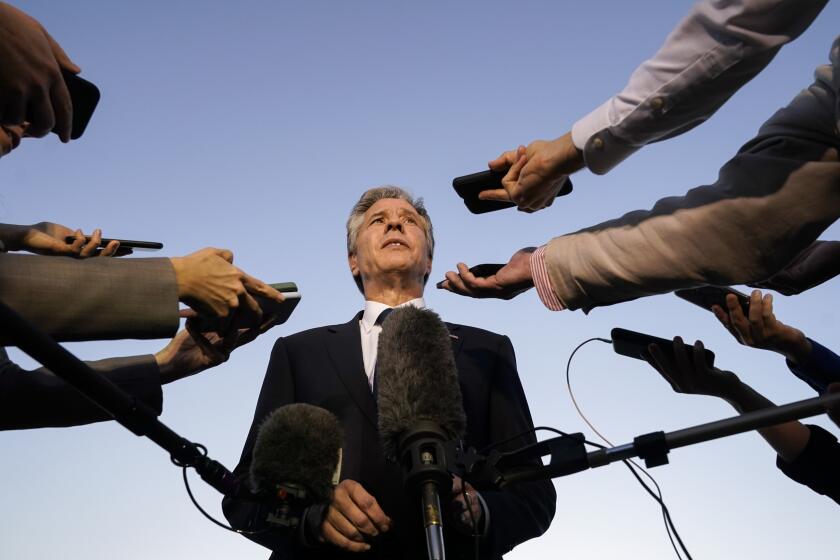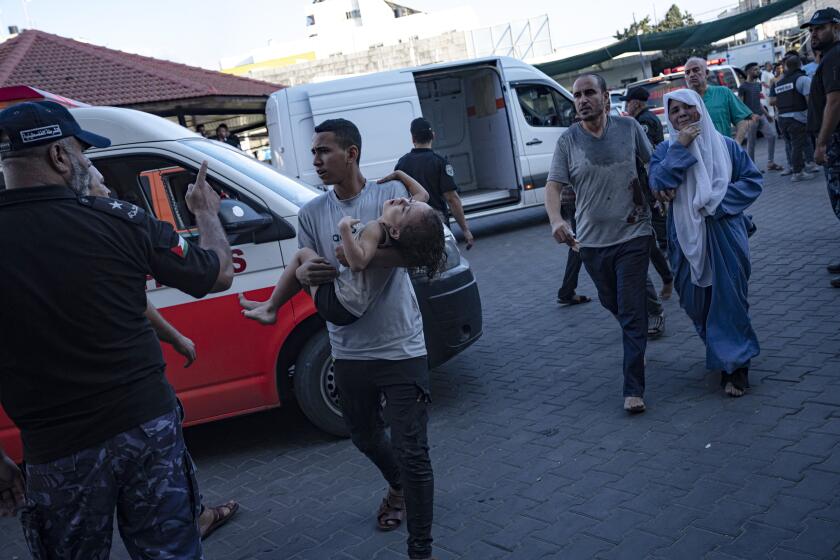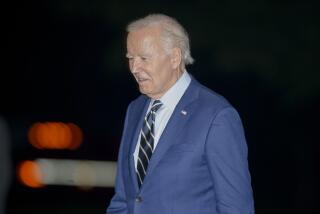Biden wraps up visit to wartime Israel with a warning against being ‘consumed’ by rage
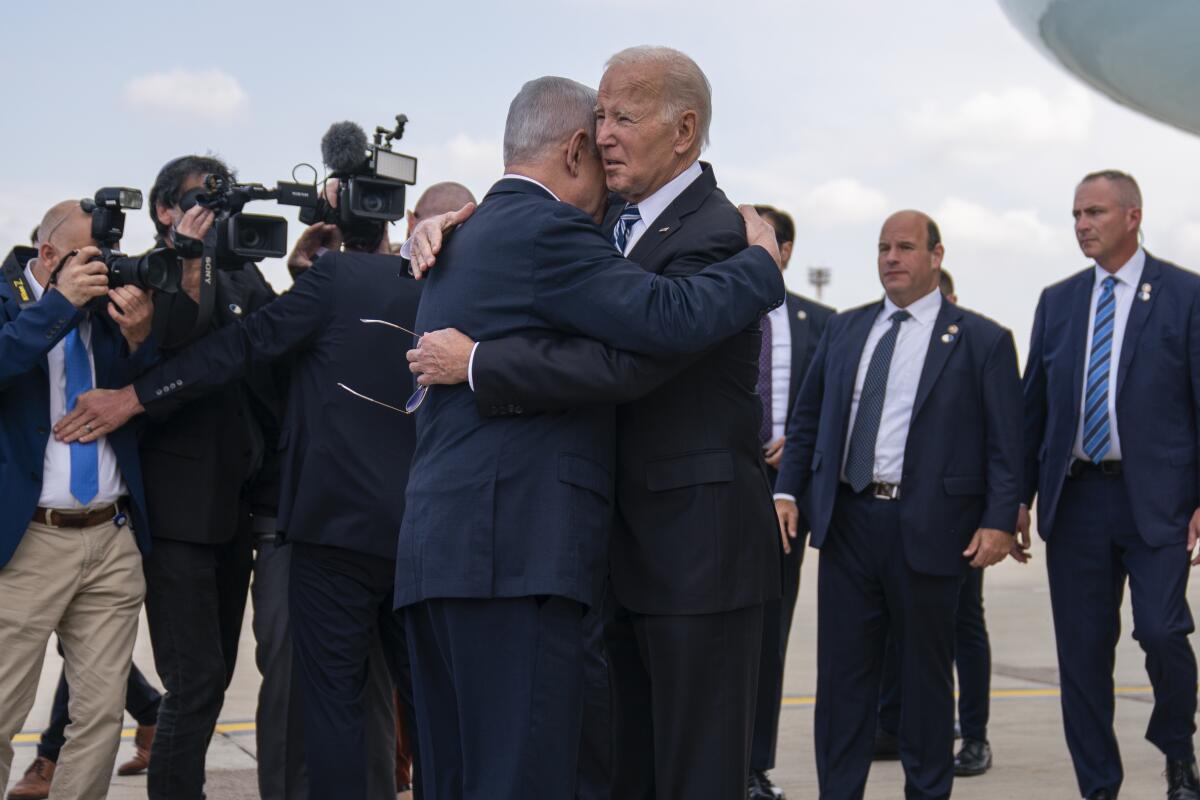
TEL AVIV — President Biden said Wednesday that Israel had agreed to allow humanitarian assistance to begin flowing into Gaza from Egypt, with the understanding that it would be subject to inspections and that it should go to civilians and not Hamas militants.
In remarks from Tel Aviv, where the president had gone to show support for Israel after the brutal and deadly attack by Hamas militants that killed roughly 1,400 people, Biden cautioned the nation against all-consuming rage.
“I understand. Many Americans understand,” Biden said as he wrapped up his stay in Tel Aviv, likening the Oct. 7 Hamas attack to the attacks against the United States on Sept. 11, 2001, that killed nearly 3,000 people. “You can’t look at what has happened here ... and not scream out for justice,” he said.
“But I caution this: While you feel that rage, don’t be consumed by it,” he said. “After 9/11, we were enraged in the United States. And while we sought justice and got justice, we also made mistakes.”
Biden urged Israel to step back from the brink, not just to ease growing tensions in the Mideast that threaten to spiral into a broader regional conflict but also to reassure a world rattled by images of carnage and suffering, in Israel and Gaza alike. One million people have been displaced in roughly 10 days, according to the United Nations.
With hundreds of Palestinian civilians reported dead in a Gaza inferno, dueling narratives from Israel and Hamas highlight danger that the war may spread.
Biden’s mission was to display resolve for Israel and to diminish the likelihood of a wider war, while providing assurances that he was not overlooking the increasingly dire humanitarian situation in Gaza. But it was not clear how far the trip would take Biden in trying to tamp down volatile Mideast divisions, particularly after the collapse of his plan to follow the Israel stop with an Arab leaders summit in Jordan.
Israel and the Palestinian militant group Hamas appear set to go head-to-head on the ground in Gaza. What’s each side’s endgame?
The day was full of signature Biden moments as he walked a careful diplomatic line. He doled out embraces to Prime Minister Benjamin Netanyahu and to first responders, doctors and victims who witnessed nightmare moments. He spoke quietly of his own history with grief. He told the familiar anecdote about meeting every Israeli prime minister over more than five decades in elected office, starting with Golda Meir in 1973. He quoted an Irish poet.
“I come to Israel with a single message: You’re not alone,” Biden said. “As long as the United States stands — and we will stand forever — we will not let you ever be alone.”
His presence and comments to Israeli leaders held weight. Netanyahu said that the president’s visit was “deeply, deeply moving” and that Biden had rightly drawn a clear line between the “forces of civilization and the forces of barbarism.”
The Israeli military said in a statement on Saturday night that it was preparing a coordinated offensive in Gaza using air, ground and naval forces.
“The civilized world must unite to defeat Hamas,” the Israeli leader said.
Biden arrived in Israel as nations across the Mideast shook with protests triggered by an explosion Tuesday at a Gaza hospital that killed hundreds.
The blast undid plans for Jordan’s King Abdullah II to host Biden along with Palestinian Authority President Mahmoud Abbas and Egyptian President Abdel Fattah Sisi. Abbas withdrew in protest of the hospital attack; the summit was subsequently canceled outright. Biden was expected to speak to Abbas and Sisi by telephone Wednesday as he returned to Washington, but his presence in Israel prompted fresh outrage.
In Amman, a sign hoisted by one protester labeled Biden and Netanyahu war criminals and said, “Partner in Crime.” At the Palestinian refugee camp of Ein el-Hilweh in south Lebanon, protesters set fire to a cardboard cutout of Biden’s head with a rope around his neck and blood painted over his mouth.
Despite the likelihood that an Israeli invasion of Gaza could claim thousands of lives, some U.S. officials say Israel’s desire for revenge over Hamas attacks is justified.
Ayman Safadi, Jordan’s foreign minister, told a state-run television network that the war is “pushing the region to the brink.”
In Iraq, coalition forces were slightly injured in a spate of drone attacks over the last 24 hours at U.S. bases as regional tensions flare after the deadly hospital bombing in Gaza.
Two drones targeted a base in western Iraq used by U.S. forces and one drone targeted a base in northern Iraq. U.S. forces intercepted all three, destroying two but only damaging the third, which led to minor injuries among coalition forces at the western base, according to a statement Wednesday by U.S. Central Command.
“In this moment of heightened alert, we are vigilantly monitoring the situation in Iraq and the region. U.S. forces will defend U.S. and coalition forces against any threat,” Central Command said in the release.
Iranian-backed militias in Iraq have threatened to attack U.S. facilities there because of American support for Israel.
Biden emerged from the day with at least an agreement by Israel to allow food, water and medicine into Gaza after days of deadlock. Israel cut off the flow of aid and fuel to the Gaza Strip after the attack that killed 1,400 civilians by Hamas, which controls the region.
The U.S. has already provided aid and military support to Israel, and officials plan to ask Congress for more than $2 billion in combined additional aid for Israel and Ukraine. Biden on Wednesday also announced $100 million in aid to Gaza and the West Bank.
“The vast majority of Palestinians are not Hamas,” Biden stressed. “Hamas does not represent the Palestinian people.”
Our close connection does not mean we agree on all aspects of the catastrophic situation in the Middle East. But the path to peace starts by not selectively grieving only those with whom we share religion or national origin.
The grim tone of the discussions between Biden and Netanyahu stood in stark contrast to their optimistic meeting just a month ago on the sidelines of the U.N. General Assembly in New York, where Netanyahu marveled that a “historic peace between Israel and Saudi Arabia” seemed within reach.
The possibility of improved relations between Israel and its Arab neighbors has dimmed considerably with the outbreak of the latest Israel-Hamas war. Israel has been preparing for a potential ground invasion of Gaza. There are also fears that a new front could erupt along Israel’s northern border with Lebanon, where Hezbollah operates. The Iran-backed organization has been skirmishing with Israeli forces.
It was not clear yet when the humanitarian aid would begin to flow into Gaza, and whether it would include fuel that could power the generators keeping open the hospitals that are flooded with injured people.
Breaking News
Get breaking news, investigations, analysis and more signature journalism from the Los Angeles Times in your inbox.
You may occasionally receive promotional content from the Los Angeles Times.
Allowing aid into the region had been seen by U.S. officials as a crucial step toward the cooling of tensions in Arab nations after the blast at the hospital, which had been treating wounded Palestinians and sheltering many more who were seeking a refuge from the fighting.
There were conflicting claims of who was responsible.
Officials in Gaza quickly blamed an Israeli airstrike. Israel denied it was involved and released a flurry of video, audio and other information that it said showed the blast was instead due to a missile misfire by Islamic Jihad, another militant group operating in Gaza. Islamic Jihad dismissed that claim. The Associated Press has not independently verified any of the claims or evidence released by the parties.
Israel-Hamas war: In Israel, a quest to identify unrecognizable bodies. In Gaza, bodies are piled and some stored in ice cream trucks as power fails.
Biden said data from his Defense Department showed that the explosion was not likely to have been caused by an Israeli military airstrike. A White House National Security Council spokesperson followed up later with a post on social media that an analysis of “overhead imagery, intercepts and open source information” showed Israel was not behind the attack. But the U.S. continues to collect evidence.
“Based on what I’ve seen, it appears as though it was done by the other team, not you,” Biden told Netanyahu.
The leaders of the U.S. Senate Intelligence Committee in a joint statement said they felt confident the explosion was “the result of a failed rocket launch” by militants and not an Israeli airstrike.
The Palestinian cause was fading in many Arab countries. The Israel-Hamas war has reignited it.
About 2,800 Palestinians have been reported killed by Israeli strikes in Gaza. An additional 1,200 people are believed to be buried under the rubble, alive or dead, health authorities said. Those numbers predate the explosion at the Ahli Arab Hospital on Tuesday.
Jordan declared three days of mourning and Jordanian officials said the summit was canceled after speaking with all leaders. Safadi said they had wanted the meeting to produce an end to the war, which seems unlikely now, and to give Palestinians the respect they deserve.
Long reported from Washington. Associated Press writers Omar Akour in Amman, Jordan, Darlene Superville in Washington and Edith M. Lederer at the United Nations contributed to this report.
Medics in the besieged enclave said they ran out of places to put remains pulled from the Israeli strikes or recovered from demolished buildings.
More to Read
Sign up for Essential California
The most important California stories and recommendations in your inbox every morning.
You may occasionally receive promotional content from the Los Angeles Times.
